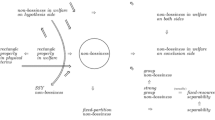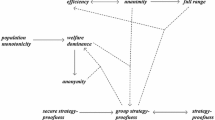Abstract
Kojima and Manea (Econometrica 78(2):633–653, 2010) present two characterizations of when an allocation rule corresponds to the agent-proposing deferred acceptance (DA) algorithm for some substitutable priority rule of the objects being assigned. Building on their results we characterize when an allocation rule is outcome equivalent to the DA algorithm for every substitutable priority rule. In particular, an assignment rule satisfies mutual best (MB) if an agent is always assigned her most preferred object whenever she has the highest priority for it. This mild requirement is a necessary but far from sufficient condition for an assignment rule to be stable. We demonstrate that any allocation mechanism that satisfies MB along with non-wastefulness, population monotonicity and either individually rational monotonicity or weak Maskin monotonicity not only is a stable assignment mechanism but is equivalent to the agent proposing DA algorithm.
Similar content being viewed by others
References
Abdulkadiroğlu A, Sönmez T (1998) Random serial dictatorship and the core from random endowments in house allocation problems. Econometrica 66: 689–701
Abdulkadiroğlu A, Sönmez T (2003) School choice: a mechanism design approach. Am Econ Rev 93(3): 729–747
Alcalde J, Barberà S (1994) Top dominance and the possibility of strategy-proof stable solutions to matching problems. Econ Theory 4: 417–435
Balinski M, Sönmez T (1999) A tale of two mechanisms: student placement. J Econ Theory 84: 73–94
Ehlers L, Klaus B (2009) Allocation via deferred-acceptance under responsive priorities. Working paper
Gale D, Shapley L (1962) College admissions and the stability of marriage. Am Math Mon 69: 9–15
Klaus B (2011) Competition and resource sensitivity in marriage and roommate markets. Games Econ Behav 72: 172–186
Kojima F, Manea M (2010) Axioms for deferred acceptance. Econometrica 78(2): 633–653
Papai S (2000) Strategy proof assignment by hierarchical exchange. Econometrica 68: 1403–1433
Roth A (1991) A natural experiment in the organization of entry-level labor markets: regional markets for new physicians and surgeons in the United Kingdom. Am Econ Rev 81(3): 415–440
Roth A, Sotomayor M (1990) Two-sided matching: a study in game-theoretic modelling and analysis. Cambridge University Press, Cambridge
Takagi S, Serizawa S (2010) An impossibility theorem for matching problems. Soc Choice Welf 35(2): 245–266
Takamiya K (2001) Coalition strategy-proofness and monotonicity in Shapley-Scarf housing markets. Math Soc Sci 41: 201–213
Toda M (2006) Monotonicity and consistency in matching markets. Int J Game Theory 34: 1331
Author information
Authors and Affiliations
Corresponding author
Rights and permissions
About this article
Cite this article
Morrill, T. An alternative characterization of the deferred acceptance algorithm. Int J Game Theory 42, 19–28 (2013). https://doi.org/10.1007/s00182-011-0311-9
Accepted:
Published:
Issue Date:
DOI: https://doi.org/10.1007/s00182-011-0311-9




